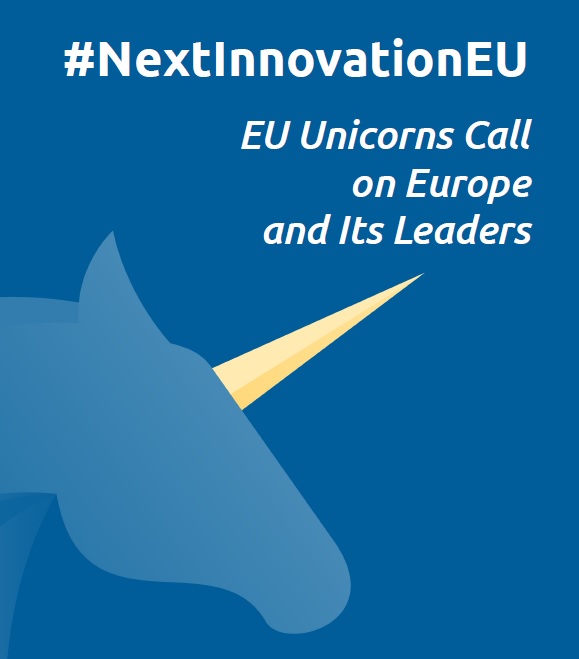Europe undoubtedly has great innovation potential. It's often said that the region's strength lies in its diversity. However, in the global tech industry and digital transformation, the USA and the Far East are leading the pack. Plus, now that the UK has left the EU's group chat, the UK's tech scene will certainly do whatever it will take to strengthen its global positions, challenging Europe's innovation competitiveness even further.
As a potential solution to Europe's innovation growth struggles, more than 30 of Europe's leading tech startups recently created an innovation policy group to produce the ultimate to-do list to foster the European innovation ecosystem – the "Next Innovation EU" report. I was delighted to participate in developing this collective vision on key components to promote tech and innovation in Europe.
As established in the report, having a small density of EU-based unicorns is one of the roadblocks that Europe faces while aiming to bolster its global position in tech. And it's undeniably true, the EU hasn't exactly been a unicorn factory lately – out of the 600 global unicorns in existence, fewer than 50 are EU-based.
But why doesn't a region with such a great talent pool and innovation potential have more $1B companies? Should aiding the "birth" of EU unicorns be the region's main focus? And how does Europe join the leaders in the digital and tech innovation playground overall?
Hindering the unicorns
According to the “Next Innovation EU” report, Europe is home to 7.2% of the world's unicorns. And even when their value is combined with that of extremely successful EU-based tech and digital businesses, the non-EU big tech companies still leave the EU's tech warriors in their shadow. But why does Europe remain in the back seat of the global unicorn bus?
While there isn't a single and definitive answer, a few factors can explain the situation. First of all, unicorns are no different from any other creature – they reside where they’re nurtured. Currently, the EU’s regional regulatory differences and the complex market structure aren't cultivating the birth of more European $1B companies. More specifically, the differences between Europe's national markets, compared to other global homogenous markets, present a considerable barrier to burgeoning startups. Despite the expansion of the Eurozone, which is supposed to benefit trading and consolidate the markets, the creation of a unified inner market that would also promote the birth of European unicorns isn't finished yet.
The current market complexity and regulatory differences significantly slow down new product testing for European businesses, leaving them behind competitors from other regions that grow considerably faster.
Moreover, Europe's current lack of joint legal frameworks has impacted investment trends in the region. Compared to the US and the Far East, European investor mentality tends to be more conservative – a quality that is nearly never favorable for startups.
As stated in the “Next Innovation EU” report, European investors often "drip-feed their portfolio companies with financial means and link every new disbursement to stringent milestones". In contrast, investors in the US and the Far East tend to give significantly larger financing amounts, allowing that capital to be used immediately. Additionally, the late-stage investments in Europe are smaller and less common, leading to European scaleups competing with non-EU scaleups that have received more funding and are growing faster. Guess who has better odds of taking the lead in such a situation?
Another considerable influence on the current number of EU unicorns is the region's lack of its own Silicon Valley equivalent. Europe's diversity may not exactly support the emergence of a single region's tech startup cluster. However, Europe has an excellent set of several "Small Valleys" – medium-size creative cities and innovation clusters, often built around historical universities (for example, Pavia, Leuven, Varna, Salamanca, Uppsala, and others). Still, to benefit from having several smaller innovation hubs rather than a single dream valley, Europe needs to think about establishing a highly functioning “Small Valley” network that connects creative and daring minds to support innovation.

Should we keep chasing unicorns?
Considering the reasons behind not having more EU-based $1B companies, the Next Innovation EU report offers several actionable points as a potential for improvement. However, the more I think about Europe and unicorns, the louder an opposing thought grows in my mind. Should Europe place all its hopes of economic growth and success on having more unicorns, or should we be considering other options as well?
Small and medium-sized enterprises are the foundation of the EU's economy, as they make up 99% of all the enterprises in the region. They provide jobs for about 100 million employees, are the source of more than 50% of Europe's GDP, and play a crucial role in shaping the region's economy overall. Moreover, SMEs are in the very midst of transitioning to a sustainable and digital economy. If SMEs are Europe's backbone, should boosting the region's innovation competitiveness focus on its small number of unicorns that much?
My suggestion lines up with embracing Europe's diversity through building a “Small Valley” network rather than crafting Silicon Valley 2.0. We shouldn't aim to replicate other regions' success stories – taking full advantage of Europe's strengths makes much more sense. And when it comes to the EU's power, a mutually beneficial blend of SMEs and unicorns and not their dominance of one or the other is what Europe needs.
How can Europe power a beneficial mix of its SMEs and unicorns? One way is through fostering shared knowledge. The road of a startup becoming a unicorn is always the one less traveled. Therefore, those who have walked the path have a unique set of experiences and valuable know-how worth sharing with others. One way to support a mutually beneficial relationship between the EU's SMEs and unicorns is the latter sharing their experience as a part of their corporate social responsibility. It can not only help other businesses in specific scenarios but also influence and shape whole industries.
One of the greatest examples of such cases dates way back in history. In 1883, the founder of Carlsberg J.C. Jacobsen decided to share the secret of purified yeast with the rest of the world. Before that, beer brewing was a hit-or-miss, no in-between, but with the recent discovery of purified yeast came a whole new beer era. He easily could've kept the discovery a secret, but instead, he decided to make his contribution to the industry, benefiting numerous brewers around the globe.
Another way to foster growth for both the EU's SMEs and unicorns is by improving the speed of patenting in the region. In contrast to the current situation where obtaining patent protection can take up to several years, a faster and more efficient system could benefit innovative solutions' growth among European startups and other companies and benefit the region's economy.
Moreover, the ongoing global pandemic has shown how important it is to enable faster patenting when society's health is on the line. If receiving a vaccine patent had to undergo a lengthy bureaucratic process every single time, the consequences would be dire. It's in Europe's very best interest to speed up the process to support the region's innovation growth and well-being of its citizens.
Finally, as noted by the “Next Innovation EU” report, digital and tech innovation tends to be concentrated in a few leading hubs, leaving Europe’s smaller or rural regions behind in digital transformation. However, the growth of local businesses – mainly SMEs – could profoundly benefit from an enabling environment that supports their digital and innovation potential.
Using local communities as testbeds would provide fertile ground for startups to build and develop new products and easier access to digital skills and tools for the local SMEs. As a result, tech startups would be able to scale more rapidly while SMEs could become more competitive through digitization.
Europe needs to gear up
Looking at Europe's road to becoming a considerable tech innovation hub and one of the global digital transformation leaders, it's apparent that the region cannot focus on a single action alone. Not fixating on growing the number of EU-based unicorns, nor devoting all the support to SMEs alone will bring Europe where it wants to be innovation-wise. It's a set of intertwined actions. As indicated by the Next Innovation EU report – a lot needs to and can be done, but it all requires joint efforts.
Whatever the EU's first step towards building a powerful innovation ecosystem will be, one thing is clear – it needs to be done right away. Living in a world where technology is developing rapidly and innovations turn into commonly used solutions in no time, having a regional environment that supports novelties rather than hindering their production is urgently needed.
Additionally, the pandemic has exaggerated the importance of innovating to prevent and solve major societal issues. We've seen that acting more radically does bring results that couldn't be reached otherwise. National Recovery Plans present an excellent opportunity for the digital and green transformation of Europe, making now the perfect time to act on improving the EU's innovation ecosystem by taking steps in previously unexplored directions.





























